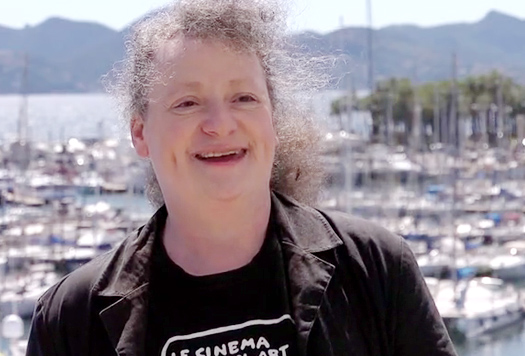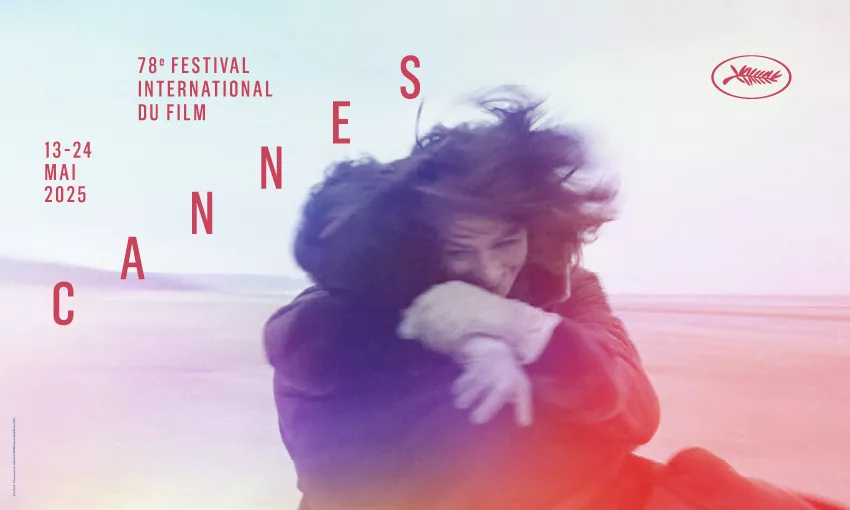In the run-up to the 78th Cannes Film Festival, which takes place May 13-24, Donald Trump issued an executive order requiring a multiplex that only shows 100% American films be erected on Alcatraz.
Okay, I made up the part about the multiplex on Alcatraz (it’ll probably be one free-standing theater) but as seen by my European colleagues, that’s not substantially nuttier an idea than slapping 100 percent tariffs on motion pictures made in something called “foreign nations.” And Mr. Trump DID make THAT very announcement on May 4th, sending the international film industry into a no-doubt justified tizzy.
Last I checked, tizzies are not conducive to personal wellness or international trade.
When Cannes artistic director Thierry Fremaux announced a big chunk of the Competition and Official sidebars on April 10 here in Paris (the list was made final on May 8), it could be said that except for some of the French entries (and even those are often made possible by—horrors!—cooperation between producers in many lands) that the world’s highest profile film event is totally awash in “foreign” fare. Look! Iranians! Palestinians! Ukrainians! Making daring and entertaining films on budgets that wouldn’t cover the craft services table fare on the average Marvel movie.
If RFK Jr wasn’t so opposed to the shots, American journalists, producers, techies, and sales agents headed to the French Riviera might be advised to get vaccinated against this whole “foreign” concept that has apparently destroyed once-great Hollywood the way moths destroyed my favorite cashmere sweater.
By the way, determining which films must be punished for shooting in the Alps instead of Akron as well as how to go about collecting such tariffs seems no more challenging than tracking down that criminal moth (it has incriminating markings on its wings confirming its membership in the notorious Lepidoptera) and deporting it to an overcrowded cedar closet in one of those foreign places to the south of the Gulf of America.
There is no more truth to the assertion that Hollywood is “dead” than there is to the theory that red neckties affect judgment. But golly, the time has come to weed out all that un-American foreign stuff from an industry built by, ahem, foreigners and the offspring of foreigners.
One last thing. Could somebody please convey to Mr. Trump that his favorite song, the one he sways to at rallies, was originated by a Frenchman? Like, a French man from France. The Village People and “YMCA” would not exist were it not for creative impulses emanating from a man raised in a foreign nation. Called France. Which is where the Cannes Film Festival is held.
If I’ve devoted so much space to the 47th President of the United States, it’s in part because I think the most important film in last year’s Cannes Competition didn’t get nearly the attention it deserved. Ali Abbasi’s “The Apprentice,” with Oscar nominee Sebastian Stan as the young Donald Trump and Jeremy Strong as the beyond-nefarious Roy Cohn, who showed the fledgling real estate developer how to be unapologetically obnoxious as a strategy in business and life seemed optional or irrelevant to a lot of people. I believe they were mistaken.
A year ago, relatively few Festival attendees would have ventured that the equivalent of the entire population of France would have voted for the guy come November.
For my money, Abbasi’ film and Mohammad Rasoulof’s Franco-German “The Seed of the Sacred Fig” outshone last year’s critical darlings “Anora,” “The Substance,” and “Emilia Perez.”
This year, at least on paper, they’ll be watching some intriguing fare. This year’s festival is dedicated to the radiant actress Emilie Dequenne who died in March, at age 43. She burst into prominence in 1999 in “Rosetta” by Belgium’s Dardenne Brothers. David Cronenberg’s jury gave the film—shown just once on the last day of the festival and less seen than higher profile titles that year—the top honor. That was perceived as an oddball choice at the time. A quarter of a century later few would argue that the Dardennes are not major talents.
They have a film in Competition this year, their tenth film to play Cannes in that category, “Young Mothers.” As Fremaux put it, “We get flack from people who say, ‘You’re not going to program the Dardennes AGAIN, are you?’ We’re like a publishing house. You don’t turn down subsequent books by an author you’ve been with from the start just because you’ve published them before. If the work is good, you continue to publish them.”
I like this explanation of loyalty in the service of presumed excellence. New talent is exciting but every entertainer who is well-known now was once unknown.
Names filmgoers the world over recognize—Wes Anderson, Spike Lee, Lynne Ramsay, Jafar Panahi, Ari Aster—have new confections that will hopefully delight festival goers. Not rooting for (non-competing world premiere) “Mission Impossible: The Final Reckoning” seems like a mission nobody could possibly accept.
In the crystal ball dept. I remain rather pleased with myself for having written in 2011 before it premiered that a love letter to silent movies called “The Artist” was the film I was most eager to see.
This year, in addition to “Nouvelle Vague,” Richard Linklater’s take on the making of Jean-Luc Godard’s “Breathless,” the movie I’m most eager to see is, like last year’s Cannes-premiering and Oscar-wining “Flow,” also a dialogue-free animation set in a post-Apocalyptic cosmos. “Planetes (Dandelion’s Odyssey)” by Tokyo-born, France-based Momoko Seto offers an irresistible pitch: Earth is destroyed, and four dandelions find themselves projected into space to embark on a search for a hospitable new environment to take root anew and keep their fluffy plant kingdom afros viable. I anticipate pistil-packing wonder, not least of which because the CNRS, France’s network for pure and applied scientific research, is a co-producer. So, if there are snails or waterfalls—and I’m told there are—you can be assured that they reek of authenticity. The film will close International Critics Week. The melding of genuine settings—as far afield as Iceland and Japan—and animation has me on the edge of my seat. Darn. This chair was made in Denmark.
In Competition, I am salivating to see what Iran’s Saeed Roustaee has come up with after the astonishingly good “Leila’s Brothers” three years ago. His new film “Woman and Child” features some of the best actors still working in Iran.
Well before the foreign movie tariffs announcement, in the wake of the April 2nd global tariffs, the left of center French daily paper Liberation ran an article about several iconic American brands that it turns out are made elsewhere like Ray Bans (a village in the Italian Dolomites, take that “Top Gun”), American Girl dolls (Germany), Starbucks home-use capsules (Switzerland), Botox (Ireland). I swear, foreign nations wherever you look.
Sebastian Stan was born in Romania. These foreigners, I’m telling you—they’re everywhere.
Unlike fruit and vegetables, movies don’t spoil. And so it is that some Cannes fare is released immediately in French cinemas while other titles appear throughout the year. David Cronenberg’s take on grief from last year’s Competition, “The Shrouds” just hit French theaters on April 30th. The Chinese film “Black Dog,” which won the top prize in Un Certain Regard last year, has been going strong in French cinemas since its release on March 5th. Set in a Chinese town that’s been stripped of its mineral wealth and is more or less slated for demolition and set in the weeks leading up to the Beijing Olympics, a timeframe that also includes a total eclipse of the sun, it’s one of the best films you’re likely to see in this or any other year.
Robert De Niro will receive an honorary Golden Palm this year. Festival President Iris Knobloch waxed eloquent at the April 10th press conference about how very deserved this award is and reminded us that Martin Scorses’s “Taxi Driver” won the Golden Palm in 1976.
Knobloch also emphasized that the festival would not tolerate sexism or sexual misconduct, and she expressed complete agreement with the then just-released findings of the French government panel on sexist behavior in the entertainment industry. After months of hearings, the panel issued several hundred recommendations.
Currently running in French cinemas is a commercial I find disturbing, bragging that TikTok is an Official Partner of the Festival, which they’ve been since 2022. Two years ago, there was a giant tarp affixed to the building just opposite the main auditorium saying, in French, “This Isn’t Film. It’s a TikTok Video.” The commercial tells a young couple that the best place to find advice about what movie they should seek out next is TikTok.
Cannes still runs on a strict hierarchy where press accreditations are concerned but they have been making room for influencers. Events as huge as Cannes need deep-pocketed sponsors. But I remain puzzled by the festival’s willingness to embrace an admittedly popular app that is unquestionably eating away at the attention spans of users, particularly young users. The filmgoers of tomorrow may have had their brain plasticity irreversibly altered where the ability to focus and concentrate without getting antsy is concerned. As a member of the last analog generation, I’m worried that editors who used to say, “Give me 1000 words on attention spans” will soon be saying “Give me 5 words on attention spans.”
What else am I looking forward to?
Out of Competition, Rebecca Zlotowski’s “A Private Life” stars Jodie Foster in a French-speaking role as a psychiatrist one of whose patients has died. Her French co-stars are all incredibly gifted and Zlotowski has proved herself to be a talented director and screenwriter.
Set in 2007 and premiering in Un Certain Regard, Palestinian twin brothers Arab and Tarzan Nasser’s “Once Upon a Time in Gaza” explores the relationship between two men who deal drugs by slipping them into falafel sandwiches. I think I can safely say that most of our readers have never run across THAT story pitch before.
The new “Mission Impossible” is said to have cost $400 million. “Once Upon a Time in Gaza” called for an investment in chickpeas and pita. Film is a medium that in the right hands can entertain in the realm between modest and lavish means. Nobody can slap tariffs on creativity. And in the year that we’re celebrating 130 years since the first public showing of the Lumiere Brothers Cinematographe (December 28, 1895), that is a glorious thing.












